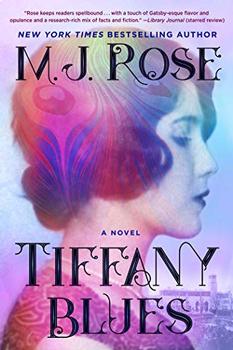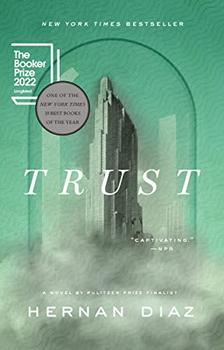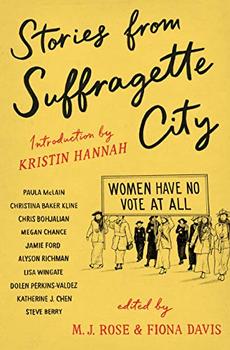Summary | Excerpt | Reading Guide | Reviews | Beyond the book | Read-Alikes | Genres & Themes | Author Bio

A Novel
by M.J. RoseI admit it. I'm an M. J. Rose fan. But this time I believe she has outdone herself.
Set in the United States post World War I, 24-year-old Jenny Bell is a starving art student. Art has given her the strength to rise above the ashes of a decidedly dreadful life, move to New York City and attend the prestigious Art Students League. Living in a hovel and waiting tables in a Greenwich Village tea room in order to afford tuition and paints, she is a conflicted loner torn between needing anonymity and seeking fortune via her paintings. Her dream is to study in Paris.
Another young woman shares Jenny's dream of studying there. Minx Deering, the overprivileged daughter of a ridiculously wealthy industrialist, is a classmate whose work Jenny admires. They become friends. Polar opposites, they support each other in all the right ways. Minx is daring, joyous, extravagant, promiscuous, outgoing to a fault and generous. She coaxes Jenny to move into her apartment. She is the steadying influence on Minx that Mr. and Mrs. Deering appreciate.
Minx loans Jenny clothes, introduces her to wealthy and connected friends and encourages her to be more assertive. When a chance to sell her drawings to a newspaper as a courtroom sketch artist presents itself, offering Jenny more money-per-drawing than she makes in a week waiting tables, the timid artist demurs. A dark secret prevents her from trusting reporters and legal authorities.
Minx, insensitive in her youth and naïveté to Jenny's reticence, pushes behind her friend's back when she can't nudge Jenny into action. And thus, Jenny is coerced into taking the courtroom sketch artist job. She soon discovers that Minx has submitted applications for them both to attend an eight-week art retreat at Laurelton Hall, the Long Island estate of Louis Comfort Tiffany. The point is to plunge 100% into one's art, sans any work-a-day distractions, amid more opulence than Jenny could ever imagine.
[W]e walked up a flight of steps and into the magical Fountain Court...Above our heads, forty-foot ceilings rose to an ornate blue and gold shimmering dome. In the center of the room, water flowed into a blue-tiled octagonal reflecting pool surrounded by potted plants. A tall glass vase fountain transformed from purple to blue to rose before our very eyes.
Rose brings Jenny's past to the surface through the young woman's luscious first-person narrative. Indeed, Jenny's voice is so rich with color, possessing so many sumptuous notes, it's like standing under a cool waterfall on a hot day with the sun's light refracting one rainbow after another. But I digress.
On an outing with her paints, Jenny encounters Louis Tiffany, who alludes to her dark past, advising her to "make the unfairness and ugliness [from her past] be the wind...Put them at your back, pushing you to search out the beauty that's not a lie." He tells her to "fight them with your paintings." It is also here that Jenny meets Oliver Tiffany, Louis's grandson whom the old man is grooming to run the family business. Himself an artist, Oliver's work is criticized as being too modern and trendy, whereas the Tiffany name had always stood for designs derived from nature. He and Jenny fall into dazzling, breathtaking love over the span of her stay. It is a magical summer of highs and lows, both mysterious and mystical that will change Jenny forever and I will not soon forget. In fact, even as a seasoned romantic fiction reviewer I was left weak-kneed by the love scene aboard Oliver's boat.
I often read books that make me want to be a better writer. I can't recall if I've ever read a book that made me want to reach for my sketch pad and charcoal. Tiffany Blues did both. But first I'm going to read it again.
![]() This review was originally published in The BookBrowse Review in August 2018, and has been updated for the
July 2019 edition.
Click here to go to this issue.
This review was originally published in The BookBrowse Review in August 2018, and has been updated for the
July 2019 edition.
Click here to go to this issue.

If you liked Tiffany Blues, try these:

by Hernan Diaz
Published 2023
An unparalleled novel about money, power, intimacy, and perception.

by M.J. Rose, Fiona Davis
Published 2022
Stories from Suffragette City is a collection of short stories that all take place on a single day: October 23, 1915.
If there is anything more dangerous to the life of the mind than having no independent commitment to ideas...
Click Here to find out who said this, as well as discovering other famous literary quotes!
Your guide toexceptional books
BookBrowse seeks out and recommends the best in contemporary fiction and nonfiction—books that not only engage and entertain but also deepen our understanding of ourselves and the world around us.